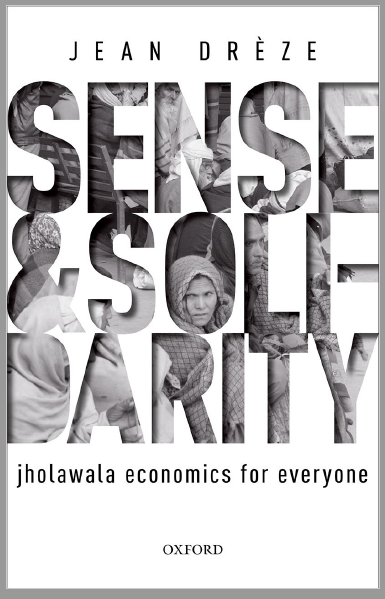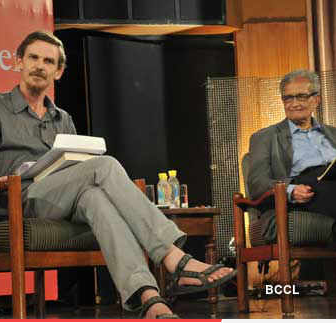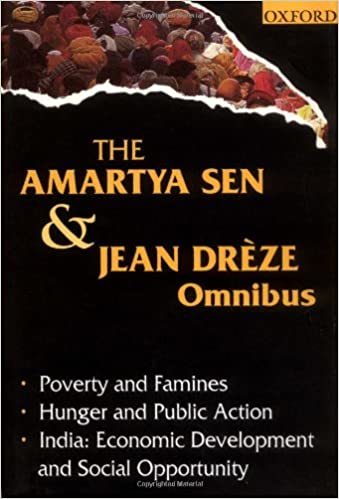Action-oriented research is a road less traveled in the world of academics. Often researchers are confronted with the dilemma of the need to remain objective while taking a clear point of view in their research. Jean Drèze, a Belgian-born Indian economist, has broken this myth by showing how action-based research can lead to tangible results while adhering to objectivity.
Drèze is one the most outstanding development economists in the world, he has been working on issues related to hunger, famine, gender inequality, child health and education in India for several decades. He has co-authored several books with the Nobel laureate Amartya Sen regarding hunger and developmental issues in India. In his book “Sense and Solidarity” published in 2017, Drèze extensively talks about action-oriented research.
However, the path to converge the two — activism and research — was not an easy task for Drèze. It was only after he met Sen, that Drèze began to find harmony between research and action. The manifestation of this amalgamation can be seen in his works, which led to some landmark welfare policies in India.
One special focus of Drèze’s action-oriented research is India’s landmark rural employment scheme, called the National Rural Employment Guarantee Act 2005 (NREGA) — a law that guarantees employment on demand to all adults in rural areas, subject to a maximum of 100 days per household per year. Drèze played a key role in the drafting of the law. In addition, he was one of the co-authors of the Public Report on Basic Education in India, also known as the ‘PROBE’ report. Launched in 1999, PROBE is an extensive investigation of the schooling situation in India, digging deep into the reasons why a large number of children were deprived of the fundamental right to education.
Drèze’s recent research interests include the impact of the Covid-19 crisis on schooling among underprivileged families. In late 2022, he conducted a quick survey on the subject with student volunteers in Jharkhand, a state in Eastern India. The results showed an alarming situation. For example, not a single school in the sample had functional toilets, electricity and water supply.
Drèze is currently an honorary Professor at the Delhi School of Economics, and a visiting Professor at the Department of Economics at Ranchi University in India. He has also taught at the London School of Economics. Drèze studied mathematical economics at the University of Essex and did his Ph.D. (economics) at the Indian Statistical Institute, New Delhi.
What motivated you to study development economics in India?
One step led to another, as tends to happen to most of us. I came to India on an exploratory visit, as a student, but the country quickly caught my imagination and became a lifelong home. For an action-oriented scholar, India used to be a great place, because of its democratic institutions. These institutions are in bad shape right now, but that’s not the last word.
You have spoken about action-oriented research in your book “Sense and Solidarity”. Can you briefly tell us how you integrated the two — research and action — into your works in India?
I have never been interested in research for its own sake. There are many possible motives for doing research. For me, it was always part of a larger endeavor to contribute to public action. For instance, my research on social policy is connected with various campaigns for economic and social rights, such as the right to food and the right to work. This research is not a standalone exercise, it feeds into collective efforts to change things on the ground.
In your research, how do you connect your findings with policy implications, particularly when the governments prefer to formulate policies on the basis of vote banks rather than facts?
First of all, we should avoid the notion that influencing government policy is the only way to achieve practical change. Public action does not necessarily take the form of government intervention. As far as government policy is concerned, in a relatively democratic society like India there are many ways of trying to influence it. We can go to the media, the courts, the parliament, or the streets for that matter. Sometimes we also get a chance to join the odd advisory body, like the National Advisory Council in 2004, and that can help too.
To conduct action-oriented research, what kind of research methodologies are most desirable? Do you think personal interactions, interviews and observations are better tools over pure data analysis?
I think that all methods are potentially useful as long as they are scientifically and ethically sound. But action-oriented research has a natural affinity with field-based and participatory methods. Practical experience is very important to understand how and why things work the way they do. Of course, this is not a substitute for data analysis. It is when data analysis and practical experience come together that we are on the strongest ground.
In your book you have mentioned dependence on funding, especially corporate funding, for research is a key challenge in action-oriented research. In that case, what are the alternatives?
I do a lot of work with like-minded friends and student volunteers who are driven by enthusiasm for action-oriented research. They are happy to work for free, use public transport and stay in the villages during field surveys. For overhead costs, we seek support from individual well-wishers. I realize that it is not possible for everyone to work in this way. The main thing is to avoid dependence on funding agencies that restrict our freedom of expression and action. Many of them have their own agenda and exert a subtle influence on the findings and uses of development research.
How do you differentiate activism from research in an action-oriented study?
Sometimes, research itself is a form of activism. For instance, when investigative research exposes corruption or propaganda, it tends to rock the boat. In general, however, I think that action and research are best seen as complementary but independent activities. Mixing the two can easily create some tensions. There is a mistaken notion that the main tension arises from the need for objectivity in research. In fact, the quest from objectivity does not prevent us from taking a position or acting on it. But other tensions can arise between research and activism. For instance, activism often involves dramatic rhetoric. That does not always fit well with the reasoned argument one expects from scholarly research.
Do you think that universities, especially the biggest names in the world of academics, are giving enough weightage to action-oriented research in the context of development studies?
I think that across the social sciences, universities could do more to prepare youngsters for action-oriented research from various positions in society, not just academic positions. When I was studying economics, I had a split personality. I was doing research for my PhD and I was an activist in my spare time, and the twain never met, because I was unable to connect research with action. It was only after I started working with Amartya Sen that the two started coming together. Things are perhaps a little better today, but even today I see a similar frustration among many students. They would like to use their research skills for a good cause, but they don’t know how to go about it. We need to create more spaces where this sort of work is possible, both within and outside universities.
If MNREGA, the 100-day guaranteed job scheme in India, is counted as a policy implication of action-oriented research, what are your reflections on two decades of its implementation? Do you think what started as action-oriented research has now transformed into a political tool?
Research rarely has “policy implications” on its own. In economics, many papers end with a section on policy implications, but most of the time these so-called implications don’t follow from the preceding research. Good policy requires not only sound research but also value judgements and inclusive deliberation. No amount of research can tell you whether MNREGA is a good idea. The campaign for this Act relied not only on some action-oriented research but also on a certain view of Indian society and a strong commitment to the interests of the working class. And yes, it is very much a political campaign. It is not an outcome of action-oriented research alone, but it has certainly built on it.
Can you throw some light on your current/ ongoing research works? What methods are you using for it?
One of my recent interests is the impact of the Covid-19 crisis on schooling, especially among underprivileged families. In late 2021, we conducted a quick survey on this with student volunteers, and the findings were really alarming. Except for a minority of privileged students who were able to continue studying online, children had been virtually abandoned by the schooling system. The survey helped to push for accelerated reopening of schools, after a gap of almost two years. Unfortunately, the schools reopened in a business-as-usual mode, and not much has been done to help disadvantaged children, as we learnt from a follow-up survey in late 2022. Very little attention is being paid to these issues, because privileged families are doing fine, so this is a case where some basic action-oriented research can really help. The same point applies to a range of economic and social rights, from nutrition and healthcare to freedom from discrimination. So, there is plenty to do.
As an economist, Jean Drèze has proved that research in social sciences can lead to tangible results. They are not merely theories discussed in academic circles, but outcomes that can change the lives of millions of people. Living a simple life in the hinterlands of India, Drèze has seen and experienced the hardships of people from close quarters. When this experience combines with his high degree of academic rigor and knowledge, we get a rare combination — a researcher who has lived, written and made tangible changes in the development landscape of India.
Namrata Acharya is a journalist with bylines in Al Jazeera, South China Morning Post Zenger News, Mongabay, The Wire, The Juggernaut, KR- Asia and more.







